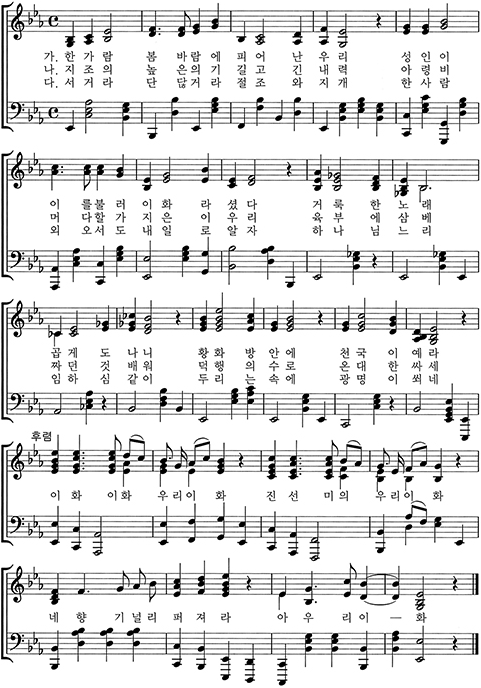Ewha’s history is filled with the miracles of God’s providence, and the path Ewha has taken shows the steps where Ewha has served God’s Word.
Ewha’s History demonstrates how the miracle of God's providence surpasses human will. Every single aspect of the righteous work that has cultivated Ewha, shows a process of serving God's holy Word. The Word of God has enabled Ewha’s community to practice the greatness of love, which has led everyone to live together as brother and sister through service and devotion in our grand history. This spirit of service and devotion is woven into Ewha’s school song, raising Ewha's morale at every occasion.
Singing a song without understanding the meaning will lead to feelings of emptiness, but learning the meaning behind the lyrics can invoke deep feelings and help you remember the song for a longer period. The word choice and phrasing in Ewha’s school song may seem pedantic at first, but once you understand the meaning behind each word, it will make you feel proud and inspired to be affiliated with Ewha.
Ewha’s school song was originally composed in 1906, 1914, and 1918, but as Ewha developed into a professional school in 1925, the song was rewritten to better depict Ewha’s philosophy. This new song was featured in the first issue of Ewha magazine in 1929. The lyrics of the current Ewha school song were written by In-bo Jung, a famous national scholar and educator in 1930s, who came to Ewha University to teach Chinese and Korean literature and inspired students with national awareness. The music was jointly composed by Ki-young Ahn and Mary Young, who were professors of music at Ewha.
-
We bloom by Han River in the warm spring breeze,
And the holy one hath called it Ewha, oh Ewha.
We sing out holy songs sweetly and softly.
The Kingdom of Heaven is here in our midst.
Ewha, Ewha, our Ewha!
True, good and beautiful Ewha.
Spread your sweet scent far and wide.
Ah, our Ewha.
We yearn for the true spirit of honor and virtue.
Shown by our great women.
‘Tis a guide to us all.
We are gathered here to grow, learn, and strive.
And wrap the whole land in our virtue and grace.
Ewha, Ewha, our Ewha!
True, good and beautiful Ewha.
Spread your sweet scent far and wide. Ah, our Ewha.
Stand tall, and reach for the sky with our high spirit.
Our duty is always to reach out.
Let no one go astray.
Like the Lord is always around us watching,
Stand in awe of God,
God's light shines on us.
Ewha, Ewha, our Ewha!
True, good and beautiful Ewha.
Spread your sweet scent far and wide.
Ah, our Ewha. -
제2절은 한국여성사 속에서 이화인이 가야할 길을 제시한 것이다.
‘지조의 높은 의기’에서 지조는 지소 부인을 이야기 하는데, 김유신의 아내이자 화랑 원술랑의 어머니로서 자녀를 의로써 키운 현명하고 지혜로운 여성의 의미를 가진다.
아령비는 신라의 시조 박혁거세의 부인 알영 왕비를 일컫는 것으로 일찍이 여성들에게 길쌈, 양잠을 독려해 일하는 여성상을 구현했던 인물이다.
‘지은이 우리’에서 지은이는 효녀 지은을 일컫는데 어머니에 대한 효성이 지극하여 수록되었는데 현대에서의 그 의미는 마음이 따뜻한 인간으로서 인격적 덕성을 갖춘 진선미의 선을 기리는 것이다.
-
제3절은 하나님의 정신을 실천하는 주체로서 이화인상을 제시한 내용이다.
‘서거라 단 닪거라’는 절조와 기개를 굳건하게 세우고, 단단하게 하라는 말로서, 정의를 지키는데 마음의 의지가 변치 않음을 다져야 함을 말한다. ‘한사람 외오서도’는 누구 하나라도 소외됨이 없이 한사람의 일이라도 나의 일로 알고 큰마음으로 품으라는 사랑의 정신을 뜻한다.
‘하나님 느리 임하심 같이 두리는 속에 광명이 쐬네’는 하나님이 온누리에 임하실 때 조심스러운 마음으로 다가서며, 하나님이 언제나 우리와 함께 계신 것 같이 두려워하는 마음으로 겸허하고 성실하게 살아야 한다는 이화인의 다짐을 말한다. 동서고금을 막론하고 모든 사회가 최상의 가치로 삼아온 진선미의 정신은 하늘에 속한 동시에 인간이 도달해야 하는 가장 궁극적 목표임이 이화의 정신 속에 강조되어 온 것이다.
’진’은 하나님의 진리를 기초로 하여 학문적 진리를 탐구하는 진실됨과 지혜로움을 말하며, 선은 인격적 덕성을 의미하는 것으로, 과거 선교사를 통해 이 땅에 실현되었던 사랑의 지고지순한 정신이 이화 공동체로 성장해 인류평화를 실현하게 하는 사회정신이다. ’미’는 인간에게 내재해 있는 아름다움이 균형과 조화를 이루는 전인교육을 뜻한다.
이렇게 이화의 숭고한 정신이 깃든 이화 교가의 의미를 알고 부를 때 진선미의 향기가 널리 퍼져 나가는 따뜻한 세상을 만드는 이화인들의 시대적 사명을 다할 수 있을 것이다.



